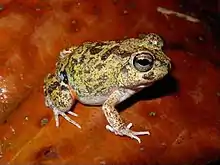Pleurodema
Pleurodema is a genus of leptodactylid frogs from South America. They are sometimes known under the common name four-eyed frogs,[1] although this name can also refer to a particular species, Pleurodema bibroni.[2] The common name is a reference to two inguinal poison glands that resemble eyes.[3] When threatened, the frog lowers its head and raises its rear. When the frog adopts this posture, the poison glands are also raised toward the predator. The predator may also confuse the frog's raised posterior for the head of a larger animal.[4]
| Pleurodema | |
|---|---|
 | |
| Pleurodema brachyops | |
| Scientific classification | |
| Kingdom: | Animalia |
| Phylum: | Chordata |
| Class: | Amphibia |
| Order: | Anura |
| Family: | Leptodactylidae |
| Subfamily: | Leiuperinae |
| Genus: | Pleurodema Tschudi, 1838 |
| Type species | |
| Pleurodema bibroni Tschudi, 1838 | |
| Species | |
|
15, see the text. | |
Species
The genus contains only the following 15 species:[1]
- Pleurodema alium Maciel and Nunes, 2010
- Pleurodema bibroni Tschudi, 1838
- Pleurodema borellii (Peracca, 1895)
- Pleurodema brachyops (Cope, 1869)
- Pleurodema bufoninum Bell, 1843
- Pleurodema cinereum Cope, 1878
- Pleurodema cordobae Valetti, Salas, and Martino, 2009
- Pleurodema diplolister (Peters, 1870)
- Pleurodema guayapae Barrio, 1964
- Pleurodema kriegi (Müller, 1926)
- Pleurodema marmoratum (Duméril & Bibron, 1841)
- Pleurodema nebulosum (Burmeister, 1861)
- Pleurodema somuncurense (Cei, 1969)
- Pleurodema thaul (Lesson, 1827)
- Pleurodema tucumanum Parker, 1927
References
- Frost, Darrel R. (2014). "Pleurodema Tschudi, 1838". Amphibian Species of the World: an Online Reference. Version 6.0. American Museum of Natural History. Retrieved 3 June 2014.
- Frost, Darrel R. (2014). "Pleurodema bibroni Tschudi, 1838". Amphibian Species of the World: an Online Reference. Version 6.0. American Museum of Natural History. Retrieved 29 June 2014.
- "Species profile: four-eyed frog". Conservacion Patagonic. 2012-11-16. Retrieved 9 January 2014.
- Duellman, William E. (1994). Biology of Amphibians. Baltimore: JHU Press. p. 670. ISBN 9780801847806.
This article is issued from Wikipedia. The text is licensed under Creative Commons - Attribution - Sharealike. Additional terms may apply for the media files.